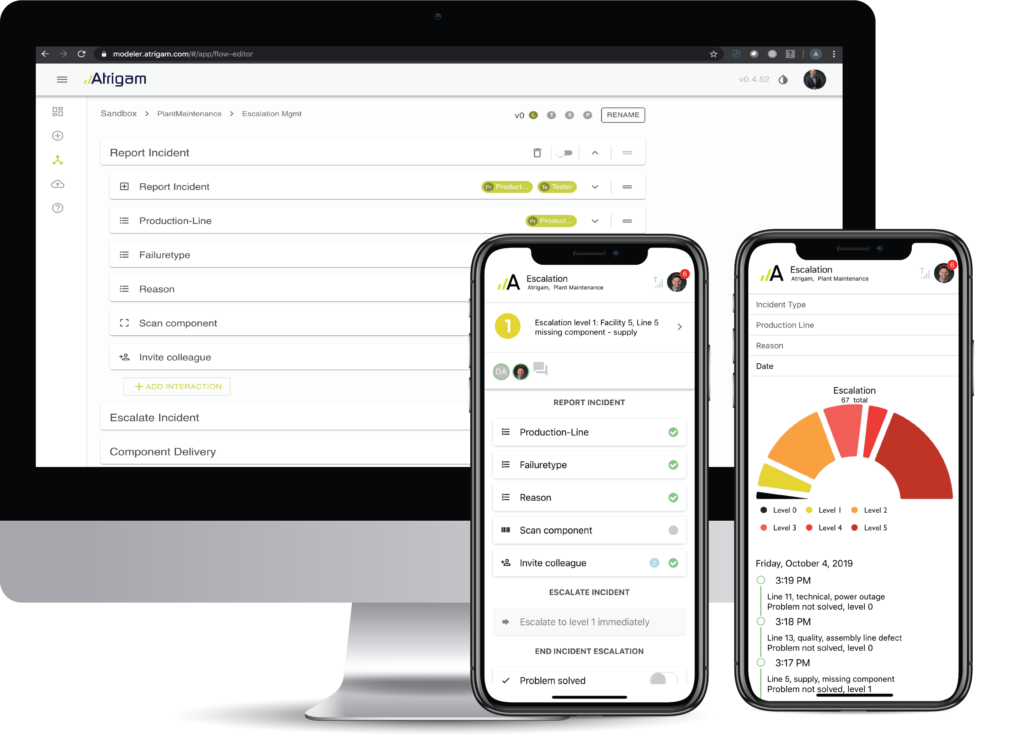"In five minutes, anyone can build a solution to their own problem"
Judith Hillen
Long coordination loops via e-mail and telephone and the constant need to look at various Excel spreadsheets cost too much time and make collaboration in companies inefficient. Andreas Geiger, who has developed a platform with his startup Atrigam to make collaboration in companies more productive, is convinced of this. Recently, the Düsseldorf-based startup became part of the 5-HT network. "The special thing about it is that we enable employees in companies to create solutions for their concrete problems quickly and easily", says Andreas Geiger, CEO and founder of Atrigam. In an interview with 5-HT he explains how this works and for which applications the productivity platform can be used.
 Andreas Geiger, CEO and founder of Atrigam
Andreas Geiger, CEO and founder of AtrigamWhich aspects contribute to the fact that cooperation in companies becomes unproductive?
Before I founded Atrigam, I held various management positions in the business and IT industry and discovered that the cooperation between the individual departments of a company, but also between different organizations is often highly inefficient. Employees waste a lot of time gathering information from emails, entering it into Excel spreadsheets and agreeing on the latest status of a project or a specific task over the phone. Another problem is that they are often inundated with information even though they are actually only interested in a few points from which they can derive concrete actions. These experiences gave me the idea that a productivity platform would make cooperation and information exchange much more effective.
What added value does Atrigam offer compared to other technological solutions?
On the one hand, there are static solutions such as ERP systems, which are used more for documentation than for collaborative work, and on the other hand, there are pure communication tools such as Microsoft Teams or Zoom, which do without any context. We place ourselves right in between: With our platform Atrigam our customers can develop individual solutions to quickly exchange essential information with the relevant people in concrete, structured contexts.
Why does Atrigam rely on customers developing these solutions themselves?
Although the employees in the company know their own problems best, it is practically impossible for them to develop technological solutions themselves because they depend on IT experts for this. When I founded Atrigam, I was therefore driven by the goal of creating technology that is so easy to use that even employees without special IT skills are empowered to solve their own problems. This speeds up the process considerably: You don't have to hire a software team or an external developer, but can easily build a task flow yourself in five minutes. Especially when unforeseen situations arise, you ultimately need a solution immediately and cannot wait for weeks. In addition, the task flows can be expanded at any time with our platform. Very few employees can tell on the first day how exactly the solution they want should look like. Instead, they only find out what needs to be changed when they try it out. That's why it's much more efficient to build and test a quick first version in five minutes, instead of first writing page-long specifications, then waiting for development and finally discovering during testing that something is still missing.
For whom is the use of the productivity platform of Atrigam interesting?
Our platform is not geared towards a specific industry, but can be used across all industries. It is interesting to use it wherever more than two people are involved in a specific task. If I notice that those involved are beginning to solve the problem inefficiently by e-mail and telephone without taking a structured approach, then it's worth giving our platform a try. After all, an application is built in five minutes, so the time investment is zero. Companies can register on our website and build a free trial version of their application. Only when they decide to use the solution in a productive environment do they incur costs.
How do the solutions that can be built with Atrigam work?
Our mobile applications offer a combination of a structured context with interactions that allow information to be captured and edited, and a context-based messenger. When you build an application, you can add different people in different roles, such as the electrician, the logistician, or the project manager - it's as easy as building a WhatsApp group, but in a structured context. You can decide which person should make an entry in which field or be notified when a change is made. With a click on the corresponding push notification, the person lands directly in the appropriate context and has all information available in real time. The fact that our applications are mobile additionally accelerates the processes. As a project manager, I may not have time to answer my e-mails in detail when I'm in meetings all day, but I still find time for a quick click in an app.
For which specific applications is Atrigam suitable?
A concrete use case, which is also relevant for the pharmaceutical and chemical industry, is escalation management. If disruptions occur in the production process, escalation is usually carried out by e-mail or telephone. This is not only time-consuming, but it often happens that the information is forwarded too late. For example, the technician first tries to repair the machine himself, forgets about the time, and in the end the management wonders why the production line has been at a standstill all day. With our solution, the information can be automated, time-controlled and escalated upwards depending on the context. First, the user enters what kind of malfunction is involved. Within this context, people can then be added automatically or manually to help resolve the problem. The interesting thing is that we always have a structured environment. For example, if the user indicates that the fault is due to a power failure, the system automatically invites the electrician. If, on the other hand, missing material is the cause, the logistics department or even the relevant suppliers can be called in. Atrigam also enables more complex applications, for example in product change management or crisis management.
 Atrigram Escalation Management
Atrigram Escalation ManagementWhat stage of development is Atrigam currently in?
I already had the first ideas for the concept five years ago. Seven months ago, Atrigam was then officially founded. Currently I am working with my co-founder Roland Rust and four other independent developers. We are currently conducting the first pilot projects on the topics of escalation management and product change management in the automotive supplier industry, but are also in discussions with other companies, for example from the mechanical and plant engineering sector.
What are the next goals for Atrigam?
On the one hand, we are looking for further interested parties for pilot projects. But we also want to have found the first paying customers by the end of the year. The pilot projects to date have shown that the platform is stable and can also be used productively in large corporations.
What do you hope to gain from working with 5-HT?
In contrast to other startups that solve a predefined problem, we want to enable companies to tackle their individual challenges themselves. Since 5-HT is in close contact with various companies, we hope to learn more about concrete industry problems and to get into conversation with one or the other company. In a one-hour meeting we can already find out whether or not we can solve the respective problem with our platform, and if so, we can even implement a solution directly, so that the customer can take a working application with him from the first meeting.
5-HT Chemistry & Health Newsletter
Want the latest tech and industry news, events, relevant info from the ecosystem and more?
Subscribe to 5-HT Newsletter now Subscribe to 5-HT Newsletter now
Become part of the 5-HT Chemistry & Health
Exchange ideas with innovative startups and future-oriented companies in our ecosystem. We look forward to meeting you!